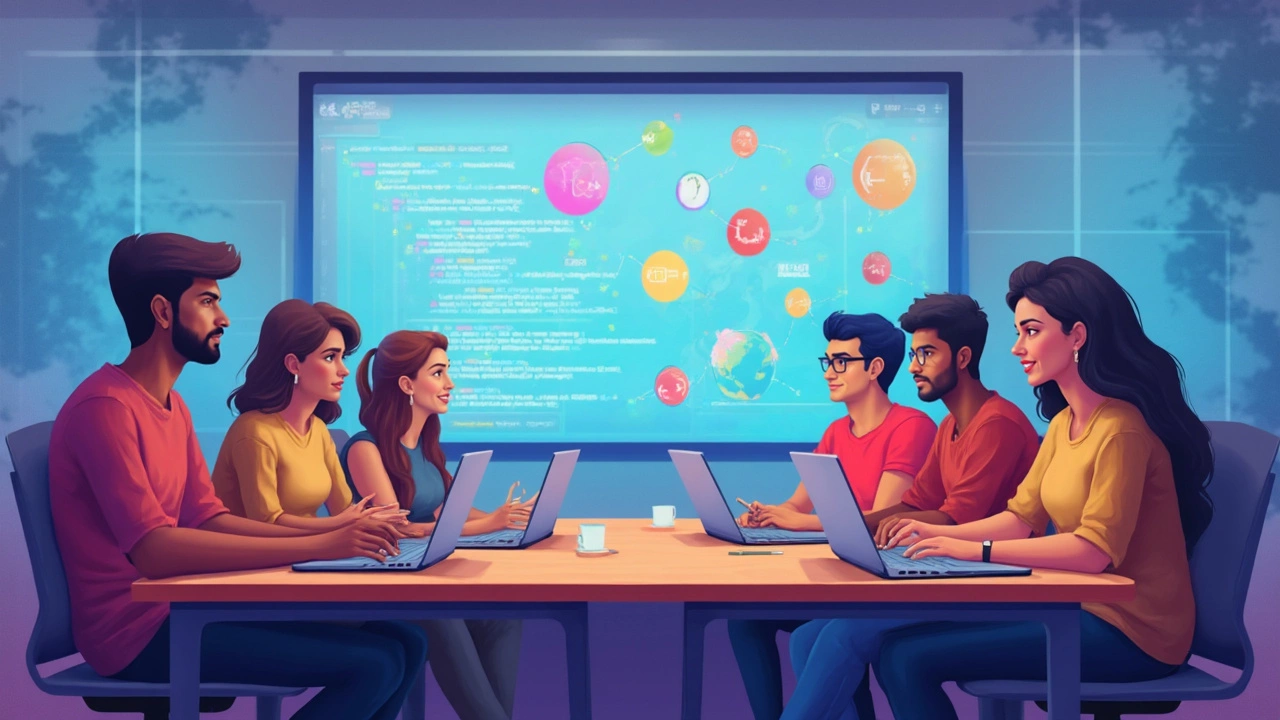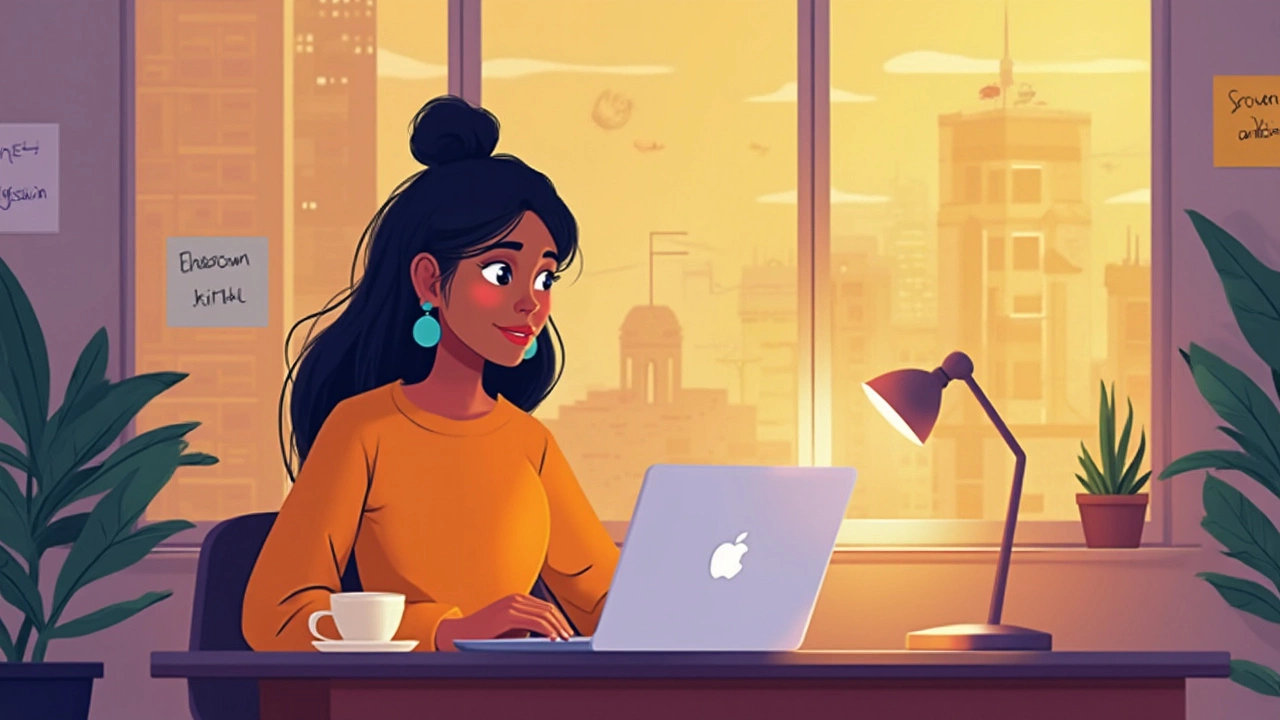Coding isn't some magic skill reserved for tech geniuses. At its core, it's just telling a computer what to do, step by step, using logical instructions. The cool part? Anyone can learn it, even if you’ve never written a single line before.
The biggest question beginners face is, 'Where do I even start?' Books and fancy blog posts make it sound harder than it is. In reality, you don’t need math wizardry or a computer science background. You just need to be willing to try, mess up, and try again. That’s normal—everyone starts clumsy.
Most coders today started with simple 'Hello, world!' programs. It’s a tiny line of code that tells your computer to say hello. This isn’t useless. It’s the very first victory that gives you a taste of what’s coming—a sense that, yes, you really can control what your computer does.
- What Coding Really Means
- Choosing Your First Programming Language
- Practical Ways to Start Practicing
- Common Mistakes Beginners Make
What Coding Really Means
Let’s clear something up: coding for beginners isn’t about cramming your brain with endless tech terms or memorizing weird symbols—it’s about learning how to speak to computers so they actually listen. Think of coding as breaking down a big messy problem into tiny bite-sized instructions. If you’ve ever made a sandwich and listed the steps ('grab bread, add peanut butter, top with jelly'), you’ve already done the human version of coding.
Computers don’t think like people. They need crystal-clear directions for every move. When you type out code, you’re writing those instructions in a language computers can follow. There are a bunch of these languages, like Python, JavaScript, and Java, each with their own style, but all share one core goal: making the computer do useful stuff for you.
Even simple apps and websites start with basic code. Your favorite social networks, video streaming platforms, and games all began with someone writing their first 'print' or 'alert' command. Most of the world’s biggest apps involve millions of lines of code—made up of thousands of tiny, simple steps stacked together over time.
Here’s a fun fact: In a GitHub survey from 2023, more than 60% of people who learned to code last year did so entirely online, using free resources or beginner-friendly courses. This means that access isn't a barrier—motivation is. If you’ve got access to a device and Wi-Fi, you’re set.
- Learn programming by copying simple examples and seeing what happens.
- Test and tweak until the computer does what you expect.
- Don’t worry if things break—errors are your best teachers.
Coding isn’t about speed or perfection. It’s about asking, 'What do I want this thing to do?' and then experimenting till it works. The more you mess around, the more you pick up, and suddenly, writing code feels a lot less like rocket science and a lot more like common sense.
Choosing Your First Programming Language
This step trips up a lot of people. There’s so much hype and heated debates online, but here’s the honest truth: there is no universally perfect language. It all depends on what you want to build or how you plan to use your new coding for beginners skills.
If you’re just starting out and want something that feels friendly, Python is hands-down the winner for most newcomers. Python’s syntax (the way you write it) is clean—no weird curly braces or cryptic letters everywhere. It’s actually the top choice in loads of beginner coding classes all over the world, partly because it looks almost like plain English.
Here’s a rough idea of what languages fit different needs:
- Python: Great for total beginners, web apps, data analysis, and even simple games.
- JavaScript: The go-to for web development. If you want to build websites that do stuff—not just sit there looking pretty—this is it.
- Scratch: Made for kids (but adults like it, too). It’s visual—drag and drop blocks, no typing. Perfect if regular code looks scary right now.
- Java: More old school, but still used everywhere. Good for Android apps and big corporate stuff.
Check out this quick table to see how popular languages stack up for new coders. This data is from the TIOBE Index for early 2025:
| Language | Ease for Beginners | Main Uses |
|---|---|---|
| Python | Very Easy | Web, Data, Robots, Automation |
| JavaScript | Easy | Websites, Browser Apps |
| Scratch | Super Easy | Games, Learning |
| Java | Moderate | Android, Banking Systems |
Don’t get stuck in endless research. Pick one that matches what you want to make and just start. Switching languages later gets way easier once you’ve got the basics down.

Practical Ways to Start Practicing
Getting started with coding for beginners is way easier now than a decade ago. You don’t have to install anything complicated if you don’t want to. There are tons of online platforms where you can practice right in your browser. Try beginner-friendly websites like Codecademy, freeCodeCamp, and Coursera. These sites are set up for complete newbies—you follow bite-sized lessons and get instant feedback when you make mistakes.
If you’re still thinking, “But what exactly do I code?” start simple. Repeat that classic Hello, world! example, but change it up. Make your computer print different messages or do basic math. Most people give up because they get too ambitious too quickly, then get stuck and frustrated.
- Set small daily goals—spend 20 minutes writing, editing, or reading code. Consistency matters more than marathon sessions.
- Follow real coding challenges for beginners. Try LeetCode or HackerRank, but pick their easy sections. These are legit sites where even job interview questions are posted, so you’ll learn real-world problems.
- Join online communities. Sites like Stack Overflow, Reddit’s r/learnprogramming, or Discord groups are full of newbies and helpful folks. If you get stuck (and you will!), someone there has probably had the same headache.
- Build a tiny project—like a calculator, to-do list, or quiz. It doesn’t have to look fancy, but you’ll learn way more from building stuff than just reading theory.
Here's a quick glance at how popular beginner platforms stack up, based on recent user data:
| Platform | Monthly Users (2024) | Main Perk |
|---|---|---|
| Codecademy | 25M+ | Interactive, hands-on lessons |
| freeCodeCamp | 10M+ | Free certificates & big community |
| Coursera | 15M+ | University-backed content |
Use these tools and tips, and keep it easy at first. Remember, the best way to build confidence in coding for beginners is to keep showing up, break problems into tiny pieces, and celebrate those first working lines of code.
Common Mistakes Beginners Make
Starting out with coding for beginners can feel overwhelming. But honestly, most mistakes are pretty normal and easy to fix once you know about them. Here's what trips up most newbies.
First, a lot of people try to learn too many things at once. They bounce between languages, sign up for every coding class they find, and end up confused. It’s smarter to pick one language (like Python or JavaScript), stick with it, and build confidence before looking elsewhere.
Another classic blunder? Skipping the basics. Some beginners want to jump straight to building apps or games without truly understanding fundamentals like variables, loops, and functions. But without these, you’ll run into headaches fast. Getting a solid grasp on the basics saves you tons of frustration later.
Impatience is a common enemy. Coding is all about making mistakes. The trick is to see every error as a clue, not a reason to give up. Quick tip: don’t be scared of error messages—they teach you more than any textbook can.
A surprising study done in 2023 found that over 60% of beginner programmers don’t Google error messages. They try to solve everything on their own, which usually makes things harder than they have to be. Trust me, pros Google stuff all the time. It’s part of the job! Get comfy with searching for answers.
- Learn to read error messages—they usually tell you exactly what’s wrong.
- Don’t copy code without understanding it. Tinker with it and ask yourself, "What happens if I change this one thing?"
- Watch out for tutorials that are way above your skill level. Stick to beginner-friendly material.
- Practice regularly—small sessions every day beat a weekend coding binge.
Forgot to save your file before running the code? Accidentally used the wrong kind of bracket? Everyone’s been there. The trick is to laugh it off and keep moving. Beginner coding tips are simple, but using them makes a huge difference. You’ll make plenty of mistakes, but that’s how real learning starts.
